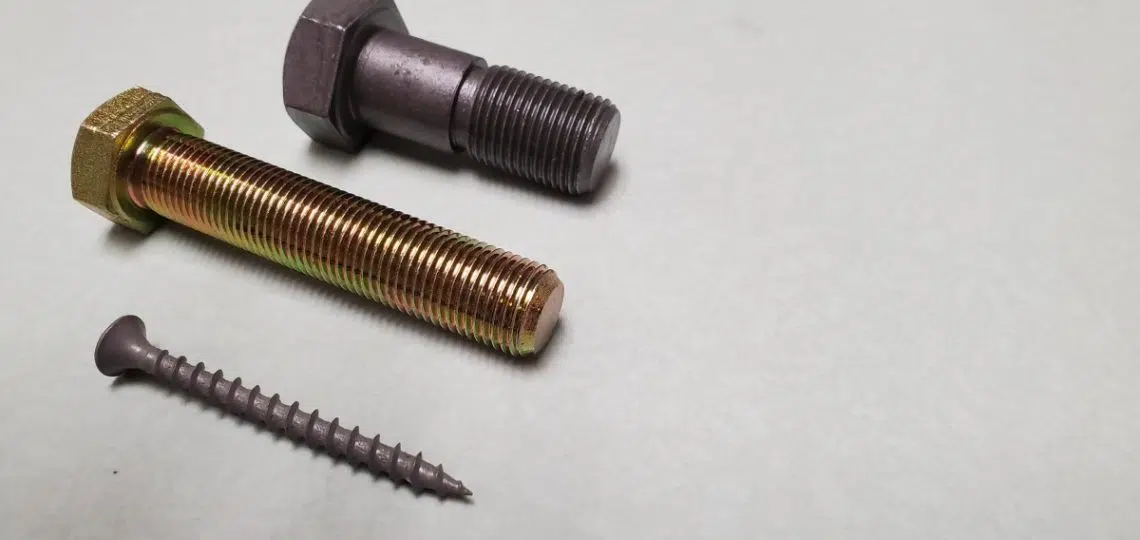If you know anything about fasteners, you won’t be surprised to read that they’re made of many different materials. But while there are probably hundreds of possibilities available, there are some that are most common, especially in the manufacturing industry. We’ll cover a few of them below, including:
Steel fasteners
Aluminum fasteners
Brass fasteners
Titanium fasteners
Superalloy fasteners
Plastic fasteners
We’ll also talk about why fastener material is important in the first place and what’s up with fastener coatings.
Why Is Fastener Material Important?
Context first. Why are fastener materials important, and what’s the point of using different ones for different applications?
Material choice influences various aspects of a fastener’s performance, design, and feasibility in certain projects. In terms of performance, fastener material has been known to affect:
- Longevity
- Tensile strength
- Weight
- Brittleness
- Corrosion resistance
- Hardenability
- Magnetism
- Reusability
- Ability to withstand extreme temperatures
Not sure what some of these words mean? Check out our Guide to Fastener Terminology.
With design, fastener material can affect appearance. If you’re working in an application where style and color is important, you need to be conscious about the material and/or coating you choose.
As for feasibility, fastener material can also affect cost. Usually, standard materials are lower on the price scale and you’ll end up paying a little extra for the specialty ones. Therefore, it’s important to find a fastener material that fits the needs of your application and your budget.
6 Common Fastener Materials
Now let’s talk about a few of the fastener materials options available to you, and what their unique properties are. While this certainly isn’t the full list, it does include some of the most common ones.
Steel Fasteners
Steel is the most common fastener material. In fact, steel accounts for almost 90% of all fasteners manufactured each year. This likely stems from the fact that steel is a relatively inexpensive material with a high level of tensile strength, durability, and formability.
Another thing that makes steel so popular is that there are many variations of it. Some of them that you’re probably familiar with are:
- Stainless steel
- Carbon steel (common at Wilson-Garner)
- Alloy steel (common at Wilson-Garner)
Each of these types of steel can also be separated into different grades. For example, some popular stainless steel grades are 304 (commercial grade – 74,000 psi) and 316 (marine grade – 180,000 psi). Other grading systems like SAE tend to deal with carbon or alloy steel fasteners. You can learn more about SAE grading systems in this blog post.
Aluminum Fasteners
Aluminum is a fastener material known for its light weight, softness, and corrosion resistance. It also has high electrical and thermal conductivity, and is non-magnetic. Aluminum is most frequently used to manufacture rivets, but can be used for plenty more types of fasteners as well.
Brass Fasteners
Brass is an alloy made primarily of copper and zinc. It’s corrosion-resistant, electrically conductive, and non-magnetic. As a fastener material, brass’s performance is limited because it’s so soft. Therefore, it’s mainly used in applications where style and appearance are most important, rather than strength and durability.
Titanium Fasteners
Titanium has one of the highest tensile strengths of all fastener materials. It’s lightweight but incredibly strong, corrosion-resistant, and able to withstand extreme temperatures. For this reason, titanium is very common in heavy-duty applications like maritime, aerospace, and military.
Superalloy Fasteners
Even stronger than titanium? Superalloys. Superalloys include nickel, iron-nickel, and cobalt alloys that are specifically made to withstand extreme temperatures and high stress loads. They are incredibly corrosion resistant and heat resistant — sometimes even up to 1000°F. Those high-performance capabilities come at a cost, however, as superalloy fasteners can be some of the most expensive.
Some common superalloys include Inconel and Monel, two nickel-based superalloys. We won’t go into too much detail on them here, but they warrant a mention because they’re fairly common fastener materials.
Plastic Fasteners
Lastly, a fastener material that’s quite different from the rest: plastic. While metal-based fastener materials are much more common, plastic has some unique characteristics that make it beneficial for certain applications.
Plastic doesn’t rust, is non-conductive and resistant to UV rays, is incredibly versatile, and generally costs less than metal-based materials. It has its place in industries like automotive, consumer goods, electronics, and furniture.
What’s the Deal With Fastener Coatings?
For many applications, the primary fastener material is just one part of the puzzle. Coatings can also be applied to fasteners to improve their performance. Specifically, coatings can affect a fastener’s corrosion resistance, lubricity, appearance, and toxicity.
There’s a multitude of fastener coating options out there, some of which you can find in this past blog article of ours. Without the right one, your fastener could be at risk for chipping, rusting, galling, and harmful chemical exposure.
However, it’s also important to know that there are some instances where a coating isn’t necessary. If your fastener won’t be exposed to any of the threats mentioned above, it’s best to avoid the coating and save yourself time and money during production.
Get Specialty, Per-Spec Fasteners at Wilson-Garner
At Wilson-Garner, we specialize in non-standard, limited-run fastener solutions. Our expertise lies in carbon and alloy steel fasteners manufactured to customer specifications. Give us a call at (800) 656-2658 or contact us online for more information.


